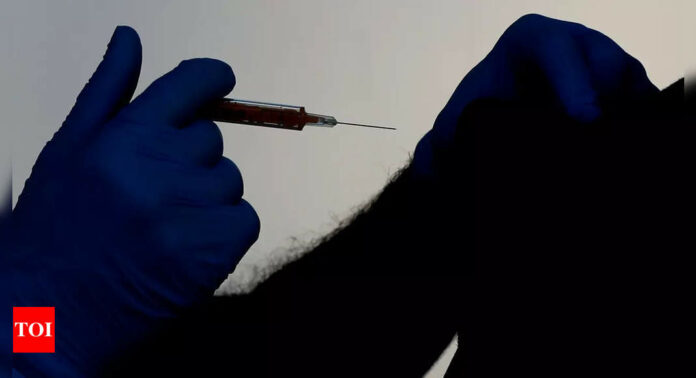BRUSSELS: The European Union’s infectious diseases agency on Thursday urged countries to push ahead with their primary coronavirus vaccination programs and played down the need for booster shoots to ward off the delta variant among the general public.
The European Centre for Disease Prevention and Control said that approved vaccines are “currently highly effective” in limiting the impact of COVID-19. “The priority now should be to vaccinate all those eligible individuals who have not yet completed their recommended vaccination course,” it said.
After a slow start to Europe’s vaccine drive, the EU‘s executive branch, the European Commission, announced this week that on average 70 per cent of adults are fully vaccinated across the 27-nation bloc. But national vaccination rates vary, with Bulgaria and Romania notably slow with their programs.
On Wednesday, France became the first big EU country to start administering booster shots of COVID-19 vaccine to people over 65 and those with underlying health conditions as the delta variant spreads in the country. Spanish health authorities are considering similar action.
The ECDC said additional shots should be considered for people “with severely weakened immune systems” if the first shots don’t protect them well enough, but that “there is no urgent need for the administration of booster doses of vaccines to fully vaccinated individuals in the general population.”
It’s common for protection from vaccines to decrease over time. For now, vaccines authorized in the EU and US continue to offer very strong protection against severe disease and death, but their ability to prevent infection is dropping markedly due to the delta surge among nursing home patients and others.
Still, many countries are struggling to administer first doses of COVID-19 vaccines and the World Health Organization had called for a moratorium on boosters and has also urged governments to donate vaccines to needy countries.
Spain’s board of vaccine experts recommended on Wednesday that a third shot be administered to people with suppressed immune systems, like transplant recipients.
Its national and regional health authorities will debate the issue on Sept. 8 at their weekly pandemic meeting.
EU commission spokesman Stefan De Keersmaecker said Thursday that the bloc has enough shots should scientific evidence suggest that boosters might be broadly required.
He said that Brussels recently concluded a contract with vaccine-maker BioNTech-Pfizer for 1.8 billion additional doses from 2021 to 2023, and a second contract with Moderna for 150 million shots for the bloc, which has a population of some 450 million people.
“We have taken the necessary measures to be ready,” De Keersmaecker said.
The European Centre for Disease Prevention and Control said that approved vaccines are “currently highly effective” in limiting the impact of COVID-19. “The priority now should be to vaccinate all those eligible individuals who have not yet completed their recommended vaccination course,” it said.
After a slow start to Europe’s vaccine drive, the EU‘s executive branch, the European Commission, announced this week that on average 70 per cent of adults are fully vaccinated across the 27-nation bloc. But national vaccination rates vary, with Bulgaria and Romania notably slow with their programs.
On Wednesday, France became the first big EU country to start administering booster shots of COVID-19 vaccine to people over 65 and those with underlying health conditions as the delta variant spreads in the country. Spanish health authorities are considering similar action.
The ECDC said additional shots should be considered for people “with severely weakened immune systems” if the first shots don’t protect them well enough, but that “there is no urgent need for the administration of booster doses of vaccines to fully vaccinated individuals in the general population.”
It’s common for protection from vaccines to decrease over time. For now, vaccines authorized in the EU and US continue to offer very strong protection against severe disease and death, but their ability to prevent infection is dropping markedly due to the delta surge among nursing home patients and others.
Still, many countries are struggling to administer first doses of COVID-19 vaccines and the World Health Organization had called for a moratorium on boosters and has also urged governments to donate vaccines to needy countries.
Spain’s board of vaccine experts recommended on Wednesday that a third shot be administered to people with suppressed immune systems, like transplant recipients.
Its national and regional health authorities will debate the issue on Sept. 8 at their weekly pandemic meeting.
EU commission spokesman Stefan De Keersmaecker said Thursday that the bloc has enough shots should scientific evidence suggest that boosters might be broadly required.
He said that Brussels recently concluded a contract with vaccine-maker BioNTech-Pfizer for 1.8 billion additional doses from 2021 to 2023, and a second contract with Moderna for 150 million shots for the bloc, which has a population of some 450 million people.
“We have taken the necessary measures to be ready,” De Keersmaecker said.


















